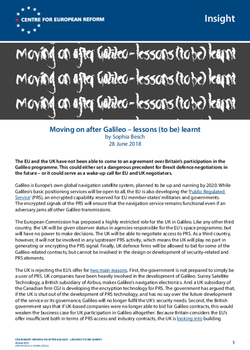
Moving on after Galileo – lessons (to be) learnt
The EU and the UK have not been able to come to an agreement over Britain’s participation in the Galileo programme. This could either set a dangerous precedent for Brexit defence negotiations in the future – or it could serve as a wake-up call for EU and UK negotiators.
Galileo is Europe’s own global navigation satellite system, planned to be up and running by 2020. While Galileo’s basic positioning services will be open to all, the EU is also developing the 'Public Regulated Service' (PRS), an encrypted capability reserved for EU member-states’ militaries and governments. The encrypted signals of the PRS will ensure that the navigation service remains functional even if an adversary jams all other Galileo transmissions.
It is not in the interest of Britain or the EU for the UK to pull out of #Galileo.
The European Commission has proposed a highly restricted role for the UK in Galileo. Like any other third country, the UK will be given observer status in agencies responsible for the EU’s space programme, but will have no power to make decisions. The UK will be able to negotiate access to PRS. As a third country, however, it will not be involved in any 'upstream' PRS activity, which means the UK will play no part in generating or encrypting the PRS signal. Finally, UK defence firms will be allowed to bid for some of the Galileo-related contracts, but cannot be involved in the design or development of security-related and PRS elements.
The UK is rejecting the EU’s offer for two main reasons. First, the government is not prepared to simply be a user of PRS. UK companies have been heavily involved in the development of Galileo: Surrey Satellite Technology, a British subsidiary of Airbus, makes Galileo’s navigation electronics. And a UK subsidiary of the Canadian firm CGI is developing the encryption technology for PRS. The government has argued that, if the UK is shut out of the development of PRS technology, and has no say over the future development of the service or its governance, Galileo will no longer fulfil the UK’s security needs. Second, the British government says that if UK-based companies were no longer able to bid for Galileo contracts, this would weaken the business case for UK participation in Galileo altogether. Because Britain considers the EU’s offer insufficient both in terms of PRS access and industry contracts, the UK is looking into building its own satellite network, potentially in co-operation with Japan or Australia, the latter one of Britain’s partner countries in the 'Five Eyes' international intelligence alliance.
It is not in the interest of Britain or the EU for the UK to pull out of Galileo. The loss of British expertise in space science and technology would be a loss to the entire EU project. Paul Verhoef, the European Space Agency’s (ESA) director of satellite navigation, has cautioned that shutting the UK out could lead to delays in getting to full operational capacity for Galileo.
An independent British system would also make industrial co-operation with Britain’s European partners harder, because all technology relying on navigation satellite signals would have to be equipped with receivers compatible with Galileo, its American counterpart Global Positioning System (GPS) and the UK system. This could cause trouble for projects like the Franco-British missile development programme.
A separate British system would also be expensive. Galileo is projected to cost €10 billion by the time it becomes operational in 2020. Estimates suggest a British system would cost at least £3 billion to £5 billion – less than Galileo, because the UK already has the expertise to develop a new programme, and because the new system would only have to fulfil the requirements of Britain and potentially its Five Eyes partners, and not those of 28 EU member-states. But for context, the UK space budget is £370 million; the defence budget is £35 billion. The UK government has publicly contemplated asking the EU to give back its past Galileo contributions. But there is little chance that the EU would agree, and the UK is understandably wary of re-opening the Brexit divorce bill negotiations.
Finally, the UK leaving Galileo also has implications for military co-operation between the UK and EU. If both sides use different encryption services, they will have trouble jointly developing operating procedures.
It would make sense to keep the UK close on Galileo – this type of positive-sum game was what many had in mind when they predicted that negotiating UK involvement in European defence co-operation after Brexit would be relatively smooth. The EU, however, was unwilling to offer the UK better access than other third countries receive.
Several factors explain Brussels’ tough approach to the Galileo issue. First, the Commission’s stance follows the core principles that were agreed by the EU for the Brexit negotiations: protecting the autonomy of its decision-making process and making sure that a non-member of the Union cannot have the same benefits as a member.
Second, individual member-states were not much involved in the EU’s emerging position on Galileo until late in the day. That is partly down to timing: negotiations between the UK and the EU team were rushed, because the ESA procurement deadline on the latest round of satellite contracts was looming. But officials in member-states have also been reluctant to focus on the highly complex and technical details of the Brexit negotiations in the area of defence. On Galileo, some in Paris and Berlin objected to the Commission acting too independently. But their objections related mostly to the process rather than the substance of the strict position the Commission has taken. In the end EU member-states authorized the ESA to shut out UK firms from the forthcoming procurement of a new batch of satellites, to be developed by 2024.
Third, many in Brussels remember that the UK initially opposed Galileo, and are sceptical about the UK’s sudden enthusiasm. They do not want to make the satellite programme’s success dependent on UK support after Brexit. In the 2016 EU Global Strategy, member-states committed to pursuing the objective of strategic autonomy. Strategic autonomy should be understood as enabling Europeans to pursue their own defence policy goals. That implies strengthening European militaries and defence industrial structures, and making the EU less dependent on the United States. In the Brexit negotiations, London is suffering from being lumped in with Washington. The Commission argues that involving the UK and its defence firms any more closely in the security elements of PRS would fundamentally change the nature of the Galileo programme from an EU project into an EU-UK project, and that relying on Britain to manufacture particularly security-sensitive parts of the system would endanger the independence of Galileo.
Positive-sum negotiations on defence co-operation turn into a zero-sum game when economic interests come into the equation.
Fourth, positive-sum negotiations on defence co-operation turn into a zero-sum game when economic interests come into the equation. With Britain ineligible to bid for contracts at the ESA, EU firms can try to buy up the UK’s expertise or build up their own capacity, for example on encryption, and secure those contracts for themselves. EU member-states will benefit from UK firms moving their operations to the continent, in order to avoid the EU’s restrictions.
Galileo is only the first of several briefs to be discussed in the Brexit negotiations on defence co-operation. As the CER has previously written, the UK and the EU still have to reach agreements on the UK’s participation in the EU’s 'defence fund', and in EU-led military operations.
The EU is currently developing strict regulations that could make all third country participation in defence fund projects very difficult. Even though these restrictions are mainly targeted against US-based defence companies, they will apply to Britain once it leaves the EU. Brussels wants to use the defence fund to incentivise Europeans to co-operate in defence capability development. By shutting the UK out, the Commission is forcing member-states to decide between taking part in the EU scheme or working with British companies.
The EU has so far refused to rethink the involvement of third countries in its operations – though this might change in the medium term – and plans to deny Britain access to early information about military planning. But events will shape military co-operation. In a crisis, EU member-states will want to work with Britain. If the EU makes it impossible to do so within EU structures, governments will find other formats. France’s European Intervention Initiative – set up to foster closer relations and a common threat perception between willing and able European militaries – was set up outside EU institutions, in part because Paris wanted to find a way of including the UK in European military planning and deployment. If the EU makes it too difficult for the UK to take part in its military operations, it would not only lose British expertise and assets, but also potentially undermine the EU’s own efforts.
Neither EU member-states nor London can afford to let the Galileo spat poison future negotiations. Instead they should learn some lessons from the episode.
Neither EU member-states nor London can afford to let the #Galileo spat poison future negotiations.
Both the EU-27 and the UK have an interest in shifting negotiations over defence out of the current legalistic approach and into a more defence-focused mind-set. Officials from national defence and foreign ministries and possibly even heads of state and government should become more involved in the Commission process for formulating the EU’s position. EU member-states need to debate their own interests and put an offer to Britain. And they should reconsider if they really want to extend the logic of strategic autonomy to the UK.
The UK, for its part, should let go of the premise that because the EU cannot afford to go without the UK in the defence sphere, it will therefore necessarily agree to the UK’s demands. Instead, Britain has to convince Europeans that its offer to become a very close defence partner to the European Union is credible, and that Britain will not – as so often in the past – become a spanner in the works of EU defence initiatives. Only then it might have a chance of being allowed privileged post-Brexit access. Even though it opposed high profile EU defence initiatives, such as the EU’s mini military headquarters, in the years before Brexit, the UK was quietly supportive of a growing EU defence role, in response to threats from Russia and terrorism. Britain needs to explain why it wants a close security partnership, rather than simply pointing out what the EU loses when Britain leaves.
Sophia Besch is a research fellow at the Centre for European Reform.


Add new comment